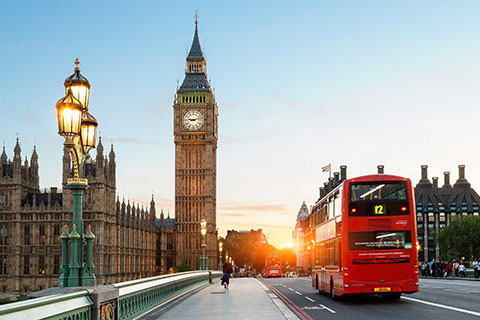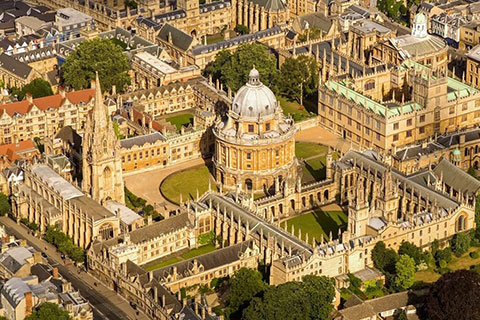
Study in United Kingdom
Last edited on 24 Feb 2026
Welcome to United Kingdom
Situated in northwest Europe the United Kingdom is a political union made up of four constituent countries: England, Scotland, Wales (Great Britain) and Northern Ireland. The two official languages in Britain are English and Welsh, English being the most widely spoken. The United Kingdom has a highly industrialised economy and the sixth-largest gross domestic product in the world. Nearly 80% of UK economy is services based, with around 19 % the industrial sector. Main industries include; aerospace, energy, chemicals, telecommunications, electronics, and financial services. The UK is one of the world’s top ten spenders on Research and Development, which topped 27 Billion Euros in 2015. It has more than 3,000 educational institutions welcoming international students.
Despite uncertainties following the nation’s referendum on EU membership in June 2016, UK universities are united in their efforts to continuing welcoming students from across the EU and the entire world. Indeed, the country is home to many of the world’s most internationally diverse campuses and communities – and this, for many, is a large part of the appeal of studying in the UK.
Higher Education System
Degrees are the most popular undergraduate qualification in the UK. They are academic courses, usually studied over three years in England, Northern Ireland and Wales, or four years in Scotland (where the title master’s degree may be awarded). University International Foundation Year courses help to bridge any gaps between qualifications already held and the ones needed to begin a degree course at a UK university.
There are a wide variety of postgraduate study options. Pre-master’s Courses can last from one term to a complete academic year. Postgraduate Certificate or Diplomas (PG Cert/Dip) are one-year taught postgraduate courses that don’t usually involve research. They’re often accepted as professional qualifications in the relevant field, giving you a head start in your chosen career. Taught Master’s (MA, MSc, LLM, MEd etc) courses generally last for one year and consist of two elements: a number of modules and a dissertation from original research. Research Master’s (MRes, MPhil) is a master’s degree by research. You will devote the entire year to research and your final mark will be determined by the quality of your dissertation. Master of Business Administration (MBA) is a specialist business taught master’s course. It’s the most popular postgraduate qualification.
A Doctorate (PhD) will take you three to four years to complete, during which you’ll be working on a single research project. New Route PhDs include taught elements as well as a research project and give you the opportunity to undertake interdisciplinary study. The UK is popular with international students and according to the latest UNESCO statistics more than 427,000 international tertiary level students studied in the UK in 2012. The UK is well-regarded internationally as a higher education destination offering a wide range of world-leading educational institutions, faculties, disciplines and courses. For e.g., A total of 45 UK universities feature in the Global Top 400 of the Times Higher Education World University Rankings 2015-2016, of which 16 are in the Top 100, and 3 in the Top 10 – Imperial College London ranked 8, The University of Cambridge ranked 4, and the University of Oxford ranked the second best University in the World.
Universities in United Kingdom
Student Cities in United Kingdom
London

The UK’s capital city ranks among the world’s best cities for students, and has an impressive 18 universities featured in the QS World University Rankings®. Home to nine million people, this large metropolis is the financial, cultural and political center of the country. London life is busy and fast-paced, so if you don’t like crowds or noise, it might not be the place for you! It has a (deserved) reputation for being expensive, so may also not be the best choice for those on a tight budget – but most of those who do study in London will agree that the city is worth every penny in the opportunities for culture, fun and networking on offer.
Home to many of the best libraries, museums, art galleries, nightclubs and theaters in the UK, and the hub of many of its most competitive professional sectors, London has more to see and do than you’ll have time to get to the end of – even if you stay long enough to complete a PhD. Indeed, there are few places in the world which can guarantee as exciting and diverse an experience – both academically and otherwise.
Universities in London include some of the world’s best, with UCL (University College of London) and Imperial College London both making the top 10 in the QS World University Rankings 2016-2017. Other top London universities include King’s College London (21st in the world), social sciences specialist London School of Economics and Political Science (LSE; joint 37th), and many more.
Manchester

Manchester is famed for its music scene – few cities have produced as many prominent bands and acts (such as the Sex Pistols and Oasis) in the past 30 years. The city is home to an eclectic range of music venues, large and small, ensuring the city’s music scene is as vibrant and fast-moving as ever. The trendy-bohemian Northern Quarter is popularly considered the cultural heart of the city, while the Canal Street area – the center of the city’s gay community – is among its liveliest nightspots.
While Manchester is undoubtedly something of a party town, it’s also big on sports – especially football (soccer). The global fame of Manchester United is difficult to beat, while local rival Manchester City is one of the wealthiest clubs in the world. Manchester should also be on your shortlist if you’re a fan of architecture – you’ll find an interesting variety of styles, from Victorian and Gothic to contemporary skyscrapers. Multicultural in general, Manchester also has the third-largest Chinese population in Europe, and a thriving Chinatown area.
Among universities in Manchester, the top ranking institution is the University of Manchester (which incorporates Alliance Manchester Business School), at 29th in the QS World University Rankings 2016-2017. If you want to get more of a feel for the city, you could tune in to the University of Manchester’s student radio station, Fuse FM, or perhaps listen to MMU Radio, run by students from nearby Manchester Metropolitan University (ranked 701+). Also just outside the city center is the University of Salford (also 701+), not far from the BBC’s MediaCity complex, and a cluster of cultural venues including the Lowry Center and the Museum of Science and Industry.
Birmingham

The UK’s second-largest city, Birmingham rose to prominence during the industrial revolution. Today Birmingham (or Brum, as it is known affectionately to locals) is a thriving commercial hub, home to the UK’s largest shopping area outside of London, and one of the most multicultural places in the UK. It offers thriving art, music and literary scenes, including the prestigious City of Birmingham Symphony Orchestra and a range of other cultural institutions.
Birmingham’s six universities also make it the UK’s largest center of higher education and academic research outside of the capital, while the ongoing ‘Big City Plan’ aims to make Birmingham one of the top 20 most livable cities in the world within 20 years. The highest-ranked among universities in Birmingham is the University of Birmingham, at 82nd in the QS World University Rankings. Other options include Aston University (ranked 358th) and four other universities, including the Open University’s West Midlands regional center. The city of Birmingham itself was a new entry in the QS Best Student Cities 2016 at 66th.
Glasgow

It may have lived for many years in the genteel shadow of Edinburgh (which, incidentally, claims the UK’s fifth highest-ranked university, the University of Edinburgh), but Scotland’s largest city has in recent years shaken off its former gritty reputation to emerge as one of the UK’s most dynamic and desirable places to live.
With historic architecture, distinctive local traditions and museums to rival any city in the UK, Glasgow now also has enough trendy bars, restaurants and gig venues to keep even the most hardened hipster entertained (plus the world’s tallest cinema). PETA has declared the city to be the most vegan-friendly in the UK. And, while Glasgow is the largest city in Scotland, it is not as overrun by tourists as Edinburgh and has a significantly lower cost of living. It also has the largest student population in Scotland (and the second largest in the UK, after London).
In keeping with the city’s general upwards trajectory, universities in Glasgow have been climbing the rankings in recent years. The University of Glasgow now stands at joint 63rd in the QS World University Rankings, while the University of Strathclyde is ranked joint 272nd.
Oxbridge

Yes, Oxford and Cambridge are two separate cities, each with a distinct history and character. But the two halves of ‘Oxbridge’ are also bound together in the collective imagination as semi-mythical academic enclaves with a profound historic affinity, as well as an ever-so-slightly tongue-in-cheek rivalry. Both are old medieval towns, built on rivers and situated towards the south of England not far from London, both are relatively quiet and peaceful, and both are completely dominated by their universities – the two oldest in the Anglophone world. Oxford and Cambridge are both collegiate universities, and their constituent colleges loom large over the city centers, which you’ll also notice are teeming with the bright young attendees (usually on bicycles when they’re not relaxing on the river in a punting boat). While Cambridge is home to a large cluster of high-technology industries such as software and bioscience, earning it the name ‘Silicon Fen’ (a play on Silicon Valley), Oxford has a long history of brewing and has been an important center of motor-manufacturing for years, with the main production site for Mini cars, now owned by BMW, based there. Both remain among the most famous and prestigious universities in the world, with the University of Cambridge ranked fourth in the QS World University Rankings 2016-2017, while the University of Oxford is sixth. And, of course, to list their notable alumni would have an effect somewhat akin to snow blindness!
Other UK cities featured in the QS Best Student Cities index include: Edinburgh, Coventry (with the highly ranked University of Warwick nearby), Newcastle-Upon-Tyne and Nottingham.
Application, Fees and Visas in United Kingdom
Applying to Universities in the United Kingdom
The UK has a centralized university admissions service which handles all undergraduate applications – the University and College Admissions Service (UCAS). This is used by both domestic and international students to apply for courses at universities in the UK. You’ll need to register on the UCAS website before completing and submitting your application. The website provides all the details on how to apply, what to include, how to track your application and how to respond to your chosen universities. It also has a guide for international students, including information about visas, student finance and more.
Once you’ve submitted your application, UCAS will send it to the institutions you’ve chosen, and then email or mail you back their response. If you’re accepted by an institution, you’ll get an ‘offer’. This can take the form of a ‘conditional offer’ which means the place is yours if you can fulfil the specified admissions criteria, or an ‘unconditional offer’ which means you’ve already reached their criteria. If you’re unlucky, you’ll receive either a ‘withdrawn application’ response, which means either you or the university has withdrawn your course choice, or an ‘unsuccessful application’ response, which means the university has decided not to offer you a place. You might be able to add another choice if you've received decisions from all five universities or colleges and were not accepted, or if you declined the offers you received.
For schools, English language centers, most further education courses and some postgraduate courses, there is no centralized application system, so you’ll need to apply directly to the institution providing the course. You can usually find application forms on the website.
All students are required to write a ‘personal statement’ explaining their reasons for wanting to study their chosen subject. If you are applying to more than one institution (as is usual), make sure not to mention any by name, as they will all receive the same personal statement. The UCAS website has a lot of tailored advice for writing personal statements, but as a rule-of-thumb, international students are encouraged to mention why they want to study in the UK rather than in their home country, how their studies will help them in the future, and describe their English language skills (perhaps by mentioning any English courses or tests they have taken).
As well as completing the UCAS process, international students may need to send copies of their academic transcripts to their course provider. This is usually because UCAS can only send some results from awarding bodies (such as the International Baccalaureate) directly to your chosen course providers. For most other international qualifications, the universities will ask that the results are sent directly to them.
There are different application forms and deadlines depending on the type of course you’re applying for. The UCAS website is usually very clear on deadlines, and it’s important to make sure you don’t miss these, as some universities may not consider late applications.
Though UCAS processes the applications, decisions about admissions requirements are made by individual universities. So, if you have any questions that are not about the technicalities of application, you should direct them to the university concerned. Before applying, make sure you read up on the course requirements, tuition fee costs and course details, emailing the university if you need more information. Remember that requirements may vary depending on your country of residence.
If you’re planning to study in the UK at postgraduate level, check out the latest edition of the QS Top Grad School Guide.
UK Tuition Fees & Living Costs
UK Tuition Fees
The level of UK tuition fees varies depending on your home country. EU students are charged the same as students from within the UK, while those from outside the EU typically face higher fees. Maximum undergraduate tuition fees at public universities in the UK also vary depending on the region: in England, universities can charge up to £9,250 (~US$11,330) per year, and in Wales up to £9,000 (~US$11,020). Scotland does not charge tuition fees at undergraduate level for domestic or EU students (except those from the other three parts of the UK, who will pay up to £9,000 a year). In Northern Ireland, Northern Irish students and those from EU countries pay up to £3,925 (~US$4,800) per year, while students from the other parts of the UK will pay up to £9,250.
International students from outside the EU can expect significantly higher tuition fees, varying between about £7,000 (~US$8,580) and £35,000 (~US$42,900) per year depending on the course. At postgraduate level, there’s no set maximum amount, and for all students (UK/EU/international), tuition fees tend to be higher than at undergraduate level. Again, this varies depending on the degree and university.
The result of the UK’s referendum on membership of the European Union (dubbed ‘Brexit’) has led to some uncertainty about whether EU citizens studying in the UK will have to pay higher fees after the UK officially leaves the EU. However, many universities have pledged to keep tuition fees at the same rate for current EU students for the duration of their studies. The UK government has also stated that there will be no immediate change to visa policies, and that EU students are still eligible for the same loans and grants.
Living Costs in the UK
You’ll need at least £12,000 a year to cover living costs in the UK (~US$14,720) and will need to budget more to live in London, where rent and other costs are considerably higher than in the rest of the UK. If applying for a visa, you’ll need to meet the financial requirements set by the UK Border Agency (UKBA). One way to save money while studying in the UK is to take advantage of the many student discounts offered by retailers – simply flash your student card to save money!
UK Student Financial Aid
There are many financial support options for international students who wish to study in the UK. EU nationals may also qualify for help from Student Finance England (SFE). UK student financial aid is applied for separately from the UCAS application. Many international students are eligible for scholarships, grants, bursaries, financial awards and loans, run by governments, charities and other organizations. You may also be eligible to apply for a QS Scholarship, while MBA candidates can apply for a relevant QS MBA Scholarship.
The Ministry of Education in your home country or even your local British Council office may have information on sources of support. For most schemes, competition is very tough, so you should apply early as you can to maximize your chances. Depending on your nationality, you may also be eligible for a loan or financial support from the UK government.
Always make sure you find out what is and is not covered by your financial support scheme so you can prepare to cover any other costs yourself. It is recommended to look for financial support before you start your course, as it can be very difficult to find funding mid-way through the academic year.
Healthcare in the UK
UCL quad
While private healthcare in the UK can be expensive, all international students on full-time courses lasting at least six months are entitled to use the National Health Service (NHS) which provides free registration and consultation with an NHS doctor (GP) or nurse, free hospital treatment when referred by your GP, and a standard charge for each item of prescribed medicine (except in Wales and Scotland where prescriptions are free).
You may be able to register with the NHS at your university health center. Otherwise, you should register at a GP center close to your accommodation or university. The UK Council for International Student Affairs (UKCISA) is also a good resource for details about healthcare, student support and working during or after your studies.
Student Accommodation in the UK
Most international students who study in the UK live in accommodation provided by the university, with main accommodation types being halls of residence, student houses and student flats. These can be catered or self-catered, with home stays (staying with a UK family) being fairly uncommon.
You can also choose from a range of private accommodation, either living by yourself or sharing with a group of friends. Try to secure your student accommodation before you arrive in the UK. International students are usually given preference for places in student halls, while there are plenty of websites to help with house-hunting. The Student Union and the Student Housing Office at your university should also be great sources of information on how to find accommodation.
Settling in United Kingdom
Cambridge Corpus Christi
You’ll probably find your UK university will hold a series of welcome events for international students, including social activities, workshops and ‘orientation sessions’, with a chance to explore the campus and local area. You can also join in with ‘Freshers’ Week’, a week-long (or sometimes fortnight-long) calendar of events designed to welcome all new students (‘fresher’ is an informal term used to describe new university students). There will also be a Freshers’ Fair, which is a chance to join student clubs and societies that interest you, including sports, art and social groups.
It is recommended that you open a UK bank account as soon as you can after your arrival in the UK. This can take a few weeks, so make sure you have access to enough cash until then. Residents of some countries may be required to register with the police.
Fast Facts
- Sovereign state with four member states: England, Wales, Scotland and Northern Ireland
- Capital city: London (also the capital of England and largest city in the UK)
- Capital of Wales is Cardiff, of Scotland is Edinburgh and of Northern Ireland is Belfast
- Constitutional monarchy with parliamentary system with bicameral legislature
- Queen Elizabeth II is head of state, a largely ceremonial role
- Head of government is the prime minister (Theresa May as of 2016)
- Developed country, and the world’s sixth biggest economy
- Was the world’s first industrialized country
- Member of European Union and Commonwealth of Nations, as well as the Council of Europe, the G7, the G8, the G20, NATO, the Organization for Economic Co-operation and Development (OECD) and the World Trade Organization (WTO)
- 14 Overseas Territories and 3 Crown Dependencies
- Official language: English (Welsh has resurged as a second language in Wales in recent years, and other regional languages include Scots and Gaelic)
- Popular sports include: football (soccer), tennis, rugby union, rugby league, golf, cricket, rowing, boxing, motorsport and horse racing
- Traditional British cuisine includes the ‘full breakfast’, fish and chips, Sunday roast, shepherd’s pie, Cornish pasties, haggis, Yorkshire pudding, Arbroath Smokie and Welsh cakes.
- Currency: Pounds Sterling (£)
- International dialing code: +44
Already decided to study in UK? Absolutely a great choice! Well, three out of ten of the world’s top universities are in the UK, including the university in the first place. Being in the top rank in the world, UK’s higher education institutions have a growing reputation in the eyes of international companies. While studying in England, students not only attend classroom sessions but also able to interact with lectures through seminars, discussions and projects. This environment would help students to improve critical thinking skills, creativity and confidence.
Additional benefits next to the academic traditions of various world-famous universities, students will receive access to the most up-to-date facilities for a world-class research. British education will also help you develop the ability and confidence in speaking English, skills that are highly valued by companies worldwide. Whatever brings you here, if you will study for an undergraduate level, boarding schools or further education college, you will be part of a multicultural environment and secure. Education institutions in the UK have a comprehensive service facility that can reliably support student. Seeking for a cultural adventure? UK offers you ranging from music festivals and sports events to an ancient castle and a vibrant nightlife. Finally, what you need to do is start preparing your application to universities. Not forget to mention, If you are looking for a financial support, Chevening Scholarships grant you a promising one.
Chevening Scholarships
Focus Scholarship: Master
Competition: worldwide
Scholarship Coverage: Full scholarship
UK Government offers its prestigious global scholarship program – Chevening Sholarships – to support outstanding emerging leaders to pursue a one-year master’s at any UK university. It is funded by the FCO and partner organisations. The scholarship programme is looking for future leaders, influencers, and decision-makers from all over the world to develop professionally and academically, network extensively, experience UK culture, and build lasting positive relationships with the UK. Available in over 160 countries and territories, the scholarships support one-year Master’s degrees in any subject and at any UK university.
Criteria
- Hold a citizenship of a Chevening-eligible country
- Hold an undergraduate degree
- Have at least two years’ work experience
- Not have previously received UK government funding to study in the UK
- Meet the Chevening English language requirement
- Hold an unconditional offer letter from at least one of three course choices
GREAT Scholarships 2021 – Indonesia
Focus Scholarship: Postgraduate
Scholarship Coverage: minimum of £10,000
GREAT Scholarships 2021, launched by the Study UK campaign together with 41 UK universities, supports postgraduate students from Bangladesh, China, Egypt, Ghana, Kenya, India, Indonesia, Malaysia, Mexico, Nepal, Pakistan, Sri Lanka and Thailand to access world-class UK higher education opportunities. Each scholarship offers financial support of a minimum of £10,000 to students pursuing one-year postgraduate study in the UK. The Study UK campaign is delivered by the British Council in partnership with the UK government’s GREAT Britain campaign, which encourages people to visit, invest and study in the UK
GREAT Scholarships 2021 launches on 17 November 2020 in Indonesia. The deadline for applications will vary depending on institutions’ own application deadlines, so applicants should check deadlines with their chosen university. The deadline for universities to select candidates for the GREAT Scholarships is 18 June 2021.
The UK attracts more than 3,000 Indonesian students every year and values the diversity and academic contribution that Indonesian students bring. The UK remains a beacon for learning, celebrated for its role in welcoming students from around the world and creating global citizens. The GREAT scholarships are testament to the UK’s commitment to supporting Indonesian students embarking on their journey to the UK, which will transform their lives and careers, giving each student an experience of a lifetime and insights that are in high global demand.
Objectives of the programme
The GREAT Scholarships are all about encouraging applications from prospective international students to the UK’s world class institutions and providing educational opportunities to students in the target countries. The scholarships programme promotes the UK’s high-quality higher education provision and reinforces the message that the UK continues to welcome the brightest and best international students.
Details of the scholarships
The twelve scholarships are offered across a broad range of subjects, each one worth a minimum of £10,000 towards tuition fees for a one-year postgraduate course.
For the 2021-22 academic year there are postgraduate scholarships available for Indonesian students at the following institutions:
- Imperial College London
- Royal Academy of Music
- Royal Agricultural University
- Sheffield Hallam University
- Teesside University
- Ulster University
- University of Bristol
- University of Cambridge
- University of Greenwich
- University of Reading
- University of Stirling
- University of York
We encourage prospective Indonesian students to apply for this exciting opportunity.
The pandemic has caused understandable uncertainty, but the UK’s world-class universities are continuing to recruit international students and they are going above and beyond to ensure that students’ physical and mental health and wellbeing are prioritised.
Making the decision to leave home and move to another country to study at a university brings challenges for international students, but it also indicates a strong commitment to embrace change and discover new ways of learning.
Don’t forget too that from summer 2021, the Graduate Route will enable international students to stay in the UK and work, or look for work, at any skill level for two years after graduation for undergraduate and master’s students. This rises to three years for PhD students.
Thank you to all of you who work tirelessly to support Indonesian students in fulfilling their UK study dream. We are extremely grateful for your support in promoting the GREAT Scholarships programme.
GREAT Scholarships 2021 – Frequently Asked Questions
The below responses can be used to answer queries from applicants to the GREAT Scholarships 2021.
- Am I eligible for a GREAT scholarship?
You are eligible to apply for a GREAT scholarship if you:
- are a passport holder from one of the following countries: Bangladesh, China, Egypt, Ghana, India, Indonesia, Kenya, Malaysia, Mexico, Nepal, Pakistan, Sri Lanka and Thailand
- have an undergraduate degree that will enable you to gain entry onto a postgraduate programme at a UK university
- can meet the academic and English language requirements of the UK university you apply to
- What is expected of me as a GREAT scholar?
We welcome applications from students who are committed to their studies and who will able to benefit from studying a postgraduate course at a UK university. We encourage you to apply if you can demonstrate your interest in your chosen subject, through examples of your work or academic experience.
We expect GREAT scholars to attend lectures and tutorials (whether online or in-person, as circumstances allow) and engage with extra-curricular activities. We want you to act as an ambassador for UK higher education by sharing your experiences and promoting the value of studying at a UK university. You may also be asked to attend a networking event with other scholars, to discuss experiences so we can capture perceptions of studying in the UK.
After your studies, we expect you to maintain contact with the British Council and act as an ambassador for GREAT scholarships, by sharing your experiences with future scholars and encouraging others to apply.
- How do I find out more information about GREAT scholarships for my own country?
Visit the ‘GREAT Scholarships’ pages on the Study UK website and look for your country. Here you will be able to read more information about the universities taking part and the eligibility criteria.
- How do I apply for a GREAT scholarship?
Visit the ‘Find a GREAT Scholarship’ page on the Study UK website and filter by your country. You can browse the universities that are offering GREAT scholarships for your country through this tool. Once you’ve explored the options available to you, visit the university’s site to learn more about how to apply. This will usually mean applying for your chosen course through the university’s own application system.
As part of the application process, you may need to send an essay. Some universities will ask for 500 words on a topic you’ve studied previously and why you found it interesting. This essay will be part of the shortlisting criteria, alongside previous academic achievement, and the potential you show. Shortlisted applicants may be asked to attend a video interview with the university’s selection committee.
The shortlisting and interview process will be managed by universities, so please contact your chosen university for more information on the application process.
- Can I apply if I’m already studying in the UK?
Yes, you can apply for a GREAT scholarship if you’re currently studying in the UK, as long as you meet the other eligibility requirements.
- When is the deadline to apply for a GREAT scholarship?
The deadline for each GREAT scholarship will vary by university, so please check with your chosen institution when the application deadline is.
The deadline for institutions to select candidates for the GREAT Scholarships is 18 June 2021.
- How much of my tuition fees does the GREAT scholarship cover?
The minimum value of each scholarship is £10,000, which goes towards tuition fees only (not other costs of study). However, some scholarships may be worth more, so remember to check the value of each scholarship on the institution’s page through Study UK’s ‘Find a GREAT Scholarship’ page.
Scholarships will be offered at postgraduate taught level (one-year master’s degrees).
- How much does it cost to study in the UK?
You can find out more about the cost of studying in the UK on the Study UK website.
- Can I apply for multiple GREAT scholarships at different universities?
Yes, you can apply to more than one university that offers GREAT scholarships.
- This scholarship isn’t for me. Are there any other scholarships available?
There are many scholarships available for international students considering UK study. Please see Study UK’s scholarships page for more information.
Many universities also offer their own scholarship programmes. We suggest browsing institutions that you might be interested in to see if there are further scholarships you could apply to.
If you’re applying for an undergraduate course, find out more about undergraduate scholarships for international students on the UCAS website.
- Where can I find more information about studying in the UK?
You can find out everything you need to know about studying in the UK on the Study UK website.
Criteria
To be eligible for this scholarship, students must:
- be a citizen of Indonesia.
- have an undergraduate degree that will enable you to enter a postgraduate (taught) programme in a UK university
- be motivated and academically able to follow a UK postgraduate course
- active in the field with work experience or proven interest in the subject area
- meet the English language requirement of the UK university
We expect scholars to attend lectures and tutorials and engage with extra-curricular activities during their studies.
We want our scholars to act as ambassadors for UK higher education by sharing their experiences and promoting the value of studying at a UK university.












